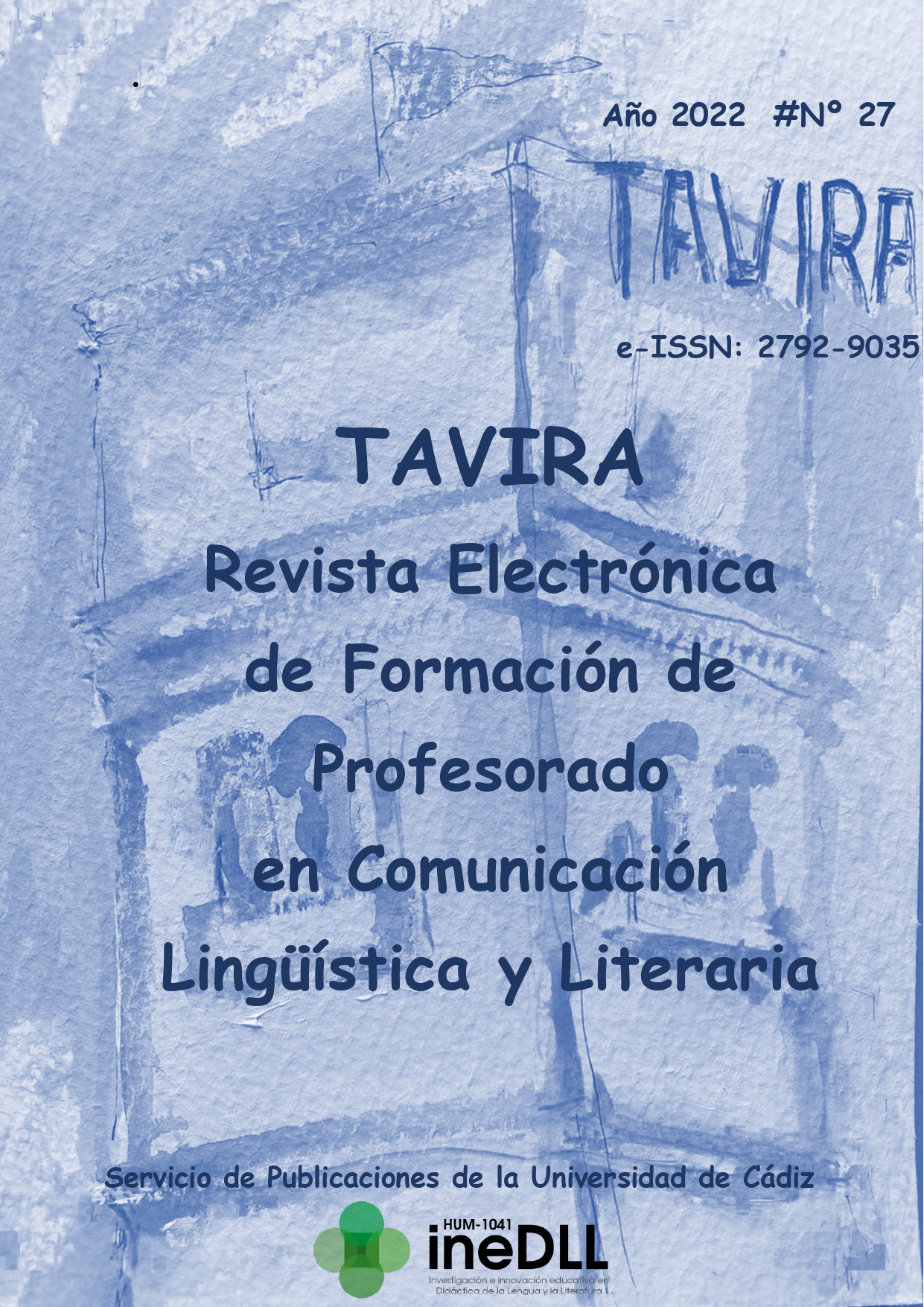Canon, literary education practices and values of the european citizenship

DOI
https://doi.org/10.25267/Tavira.2022.i27.1102Info
Abstract
The main aim of this study is to gather information on the current situation of the teaching of literature in non-university classrooms. More specifically, three aspects are of interest: the corpus of readings addressed, the classroom activities proposed and whether or not the axiological dimension of literary works is included in these activities. The methodology combines instruments from the qualitative and quantitative paradigms in order to delve deeper into the conceptions and knowledge applied by teachers in these contexts; the main ones are semi-structured interviews and questionnaires. The results obtained so far paint a picture that can be understood as a time of transition, in which the corpus is making room for children's and young people's literature, but without, especially in secondary education, the classics and traditional practices and approaches having lost their presence; genres and formats are being updated (multimodality) and reflection on values is not usual.Keywords
Downloads
How to Cite
License
Copyright (c) 2022 M.ª Pilar Núñez Delgado, María Santamarina Sancho

This work is licensed under a Creative Commons Attribution-NonCommercial-NoDerivatives 4.0 International License.
Authors who have publications with this journal agree to the following terms:
- They will retain their copyright and grant the journal the right of first publication of their work, which will simultaneously be subject to the Creative Commons Attribution License. They may copy, use, disseminate, transmit, and publicly display, provided that authorship, url, and journal are cited, and they are not used for commercial purposes. Derivative works are not permitted.
You may adopt other non-exclusive licensing arrangements for distribution of the published version of the work (e.g. deposit it in an institutional telematic archive or publish it in a monographic volume) as long as the initial publication in this journal is indicated.
Disseminate your work on the Internet (e.g. in institutional telematic archives or on your website), which can lead to interesting exchanges and increase citations of the published work. (See The Open Access Effect)
References
Braun, V., y Clarke, V. (2006). Using thematic analysis in psychology. Qualitative Research in Psychology, 3(2), 77-101.
Cerrillo, P. y G.ª Padrino, J. (1999). Literatura infantil y su didáctica. UCLM.
Cohen, L., Manion, L., y Morrison, K. (2011). Research methods in education. London: Routledge.
Colomer, T. (1991). De la enseñanza de la literatura a la educación literaria. Comunicación, Lenguaje y Educación, 9, 21-31.
Colomer, T. (1996). La evolución de la enseñanza literaria. Aspectos didácticos de Lengua y Literatura, 8. (pp.127-171).ICE de la Universidad de Zaragoza.
Colomer, T. (1999). Introducción a la literatura infantil y juvenil. Síntesis.
CONECTA (2018). Hábitos de lectura y compra de libros en España, 2018. Federación de Gremios de Editores de España (FGEE), Dirección General del Libro y Fomento de la Lectura.
https://www.federacioneditores.org/lectura-y-compra-de-libros-2018.pdf
Creswell, J.W. y Creswell, J.D. (2017). Research Design: Qualitative, Quantitative, and Mixed Methods Approaches. 4th Edition, Sage.
De Amo, J.M. (2017). Nuevos modos de lectura en la era digital. Síntesis.
EUROSTAT (2016). https://ec.europa.eu/eurostat
Gibbs, G. (2012). El análisis de datos cualitativos en investigación cualitativa. Morata.
Horizonte 2020. (2022). https://commission.europa.eu/funding-tenders/find-funding/eu-funding-programmes/horizon-europe_es
Informe 2018 del estado del sistema educativo. Curso 2016-2017 (2018). https://www.educacionyfp.gob.es/mc/cee/publicaciones/informes-del-sistema-educativo/informe-2018.html
Latorre, A.; Rincón, D., y Arnal, J. (2012). Bases metodológicas de la investigación educativa. Experiencia.
Lomas, C. (2002). La educación literaria en la enseñanza obligatoria. Kikirikí, (64), 43-50.
Marco estratégico de Educación y Formación ET2020. https://www.educacionyfp.gob.es/mc/redie-eurydice/espacio-europeo-educacion/contexto-politico/antecedentes/et2020.html
Martínez Díaz, M.ª del M., y Torres, A. (2019). Hábito lector en estudiantes de primaria: influencia familiar y del plan lector del centro escolar. Revista Fuentes, 21(1), 103-114.
Mata, J., y Margallo, A.M. (2015) La lectura: práctica social y formación escolar. Lectura, sociedad y
escuela. En J. Mata, M.P, Núñez, y J. Rienda (Eds), Didáctica de la lengua y la literatura. (pp.177-198) Pirámide.
Mendoza, A. (2010). La competencia literaria entre las competencias. Lenguaje y Textos, (32), 21-33.
Nolin, R. (2013). Pratiques déclarées d’enseignement et d’évaluation de l’oral d’enseignants du primaire au Québec. Mémoire présenté comme exigence partielle de la Maîtrise en Éducation, profil recherche. Université du Québec à Montréal.
OCDE. Informes PISA. https://www.oecd.org/pisa/pisa-es/
Promoting Gender Equality and Women’s Empowerment (2018). https://ufmsecretariat.org/wp-content/uploads/2018/10/stakeholdersWomen.pdf
Rienda, J. (2014). Límites conceptuales de la competencia literaria. Signa, 23, 753-777. https://doi.org/10.5944/signa.vol23.2014.11756
Rincón, F. y Sánchez-Enciso, J. (1987). Los talleres literarios. Montesinos.
UNESCO (2016). Marco de Acción de Educación 2030. https://unesdoc.unesco.org/ark:/48223/pf0000245656_spa






